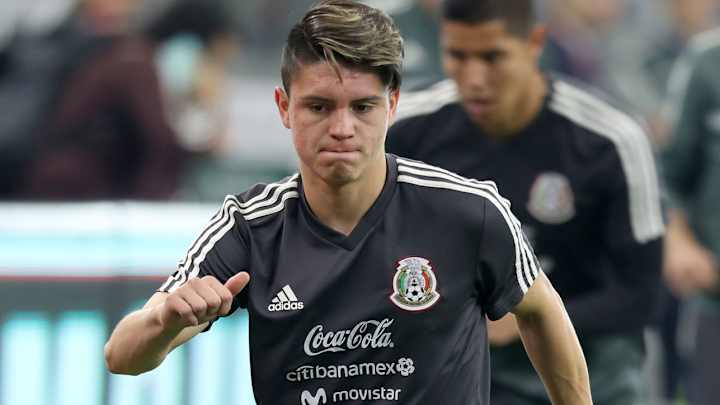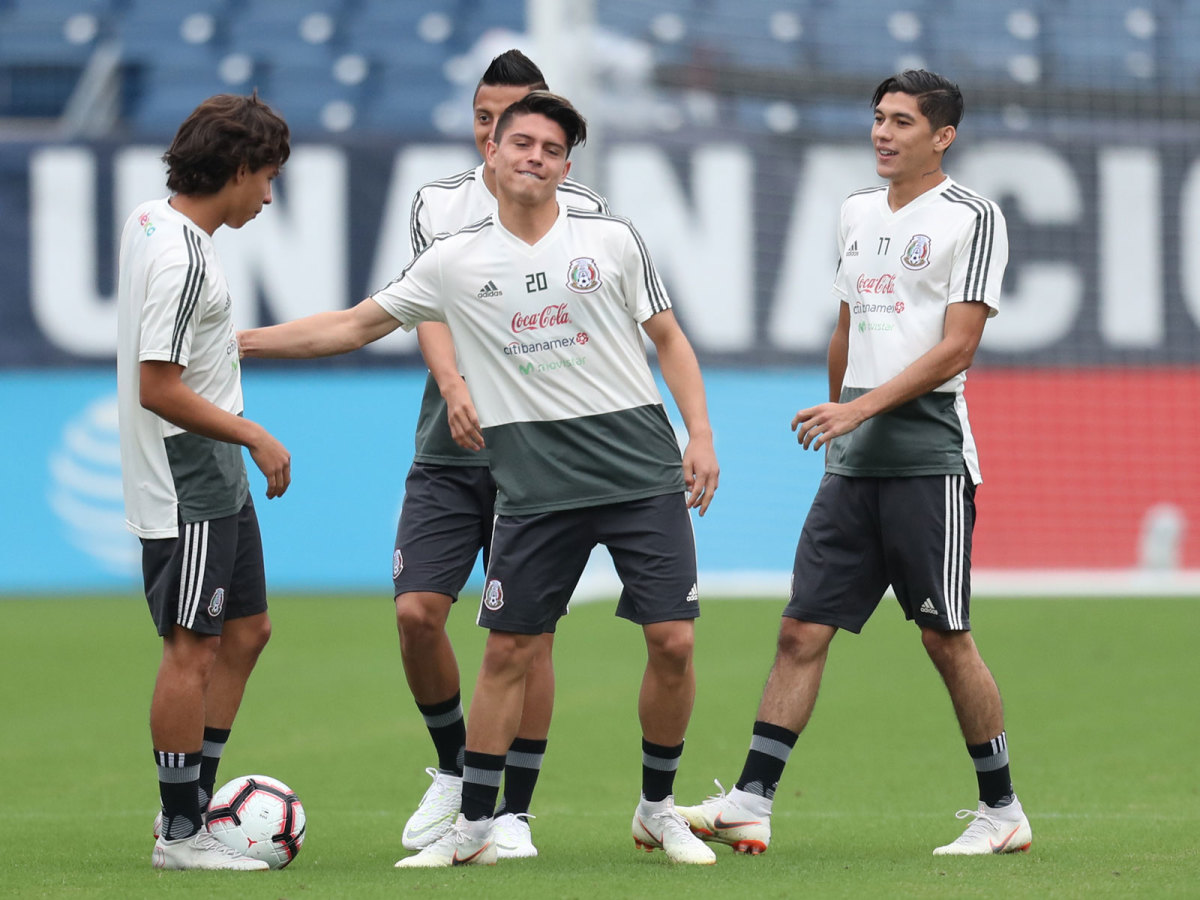Jonathan Gonzalez on U.S. Soccer and the Importance of Showing Up

When the U.S. men’s national team faced Mexico in Nashville earlier this month, Jonathan Gonzalez–recuperating from a minor injury–was forced to sit out and watch the entire game from the bench. Given his background as a Mexican-American and the year he went through after making the complex decision to play for Mexico instead of his native U.S, it’s only natural to assume the California-born 19-year-old would have been disappointed at not being able to participate.
But Gonzalez, ever the pragmatist, was fine with not playing.
“To be honest, I was completely O.K. with not taking part in the game,” Gonzalez told SI.com this week. “The boss [interim manager Tuca Ferretti] talked to me before that I wasn’t going to play, and since I was dealing with a minor injury, which pretty much affected my involvement, I fully expected not to take part. So I was totally fine with it.”
This is essentially how the mature, well-rounded Gonzalez answers most questions: calm, with common sense, free of the need to dramatize. They are personality traits that have helped the Monterrey midfielder keep a cool head on and off the field, especially over the last eight months, when his switch to play for Mexico emitted an avalanche of opinions and discussions across the U.S. soccer landscape. Many looked at Gonzalez’s decision as part of a bigger issue, regarding the U.S. Soccer Federation’s relationship with the Hispanic community.
As Blame Game Continues Over Jonathan Gonzalez's Decision, U.S. Soccer Denies Neglect
From Tab Ramos, the U.S. U-20 head coach who knows Gonzalez very well from his time in the U.S. youth setup, to interim men's national team manager Dave Sarachan, U.S. Soccer defended itself, claiming it had done a lot of work in order to stay in communication with Gonzalez and that, ultimately, Mexico's 'home-court advantage' (Gonzalez has been in Monterrey since 2014) played a major factor.
“He was living in their environment. He was under their umbrella. Whether it was Monterrey or the Mexican federation, they had home-court advantage and they put a full-court press on, and he came to that conclusion,” Sarachan told SI's Brian Straus earlier this year.
There is, however, another side of the story that Gonzalez wants to highlight. It’s not so much that there was home-court advantage from Mexico's side, but rather a lack of effort from the USSF's end to travel to Mexico and strengthen their relationship.
“I’ve been here playing in Monterrey for a while now [five years], and they didn’t make an effort to physically see me,” Gonzalez said. “And this seemed strange to me, so I think that also affected my decision.”
The claims were supported earlier in the year when ESPN’s Herculez Gomez said, via his Max & Herc podcast, that U.S. Soccer’s former full-time scout, Thomas Rongen, did not go and visit him. In addition, Brad Rothenberg, son of former U.S president Alan Rothenberg and co-founder of the Alianza de Futbol organization that helped launch Gonzalez’s career and a close contact for his family, stressed the lack of contact to SI's Grant Wahl.
“The fact is it was an accumulation of a lack of attention. When [the federation] said we were communicating with him, we weren’t talking to him. We weren’t flying to Monterrey to see him play. There were random text messages kind of left to Tab [Ramos] to be the lead on this, and it wasn’t enough. And it’s evidence that there will be more. Because until we change the way we handle kids like this, we will lose kids that have dual citizenship to Mexico.”

Whether this was the ultimate decider or not, Gonzalez, who did play in 30 games across multiple camps for U.S. youth teams after his move to Monterrey, stressed the inability to maintain a relationship beyond a phone call, text or an email played a role in his decision.
“The lack of communication showed me that they weren’t as interested in me as I thought,” said Gonzalez, who thinks his story can be used as a lesson for U.S Soccer and what it can do in order to improve engagement with the Hispanic community.
“In order to get better, I really think it’s about minimal, day-to-day things," Gonzalez said. "There is a chance for more cities and states that could be covered and going where Hispanic players live and seeing them play in their communities. Joining forces with other groups, for example.”
Gonzalez is also speaking from experience, as this is exactly how he was found in 2013, by showcasing his talents with an organization that does exactly this, Alianza de Futbol.
“I am extremely grateful to Alianza for allowing me to fulfill my dreams,” says Gonzalez. “They are a fundamental reason why I’m playing now with Monterrey, so I’m very thankful to them for everything.”
What More Must U.S. Soccer Do to Be More Inclusive of Young Latino Talent?
Officially founded in 2004, Alianza has become the largest amateur program for Hispanics–though not limited to a single demographic–in the U.S. and offers some of the biggest scouting events in the country. It organizes sponsored tournaments, free tryouts and clinics for thousands of young Hispanic players across 12 different cities. In addition, players who want to pursue a collegiate career have a chance to receive academic and financial aid thanks to the non-profit group Alianza U, which mentors and guides those who pursue soccer in college.
Other events include Alianza Femenil and Toyota Copita Alianza–a national tournament for girls’ and boys’ teams under the age of 19.
Gonzalez won Sueño Alianza in 2013, and thanks to the numerous scouts from Liga MX who were present, he received multiple trial invitations, which ended with him signing a pro contract with Monterrey.
History could repeat itself this year, as Gonzalez’s 15-year-old brother Adrian is taking part in this weekend’s finals showcase, hoping to create his own journey under similar circumstances.
From 5,000 kids, Adrian made the final 36-player roster, and his older brother wants to support him in every way he can.
“I help him in whatever way I can, as I’ve been through it and he knows how big of an opportunity this is for him and to fulfill his own dreams,” Gonzalez said.
Lessons Learned From USMNT's Friendlies vs. Brazil, Mexico
Gonzalez’s story actually holds a mirror to many Hispanic and immigrant kids in America, because a dual-national identity is a complex, delicate situation in which you’re loyal to two cultures and often, without expecting it, you feel like you belong to neither. Just like Gonzalez said in his official statement when he made the decision, the heart belongs to both nations and choosing a side can be extremely difficult. Children of immigrants relate and indeed are part of American culture, but they also feel a connection to their parents’ origins. Ultimately, it’s about choosing the place you feel most at home–regardless of geography.
When it comes down to it, and why Gonzalez decided to choose Mexico over the U.S., it’s never going to be a straightforward answer. But the midfielder’s decision and his experience do point to a general theme. If U.S. Soccer doesn’t want this to happen with more frequency in the future, it needs to do a better job of showing up.
As for the present, Gonzalez is focused on taking his game another step further. Already a key player with Monterrey (he has featured in every match so far this season), he is hoping for success with his club, setting high goals for this year’s Apertura. He also has a goal for his national team, one that could hit home with U.S. Soccer come next summer–especially if he's fit to stay on the field this time.
“Without a doubt, I want to stay a starter and become a key player for the club. And of course, be crowned in December and lift the trophy," Gonzalez said. "As for the national team? I want to keep getting called up, keep getting recognized and eventually win next year’s Gold Cup.”
